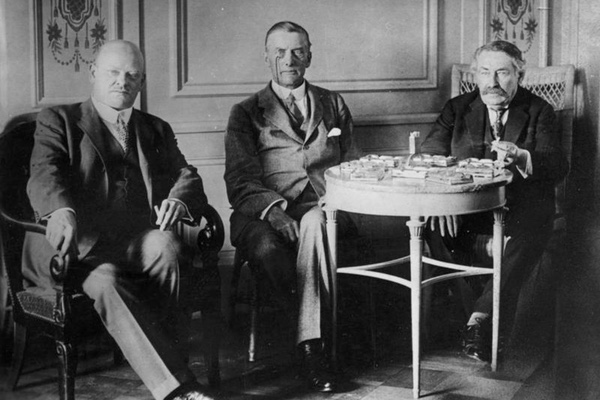90 Years Later: Is It Time to Revise Our Understanding of the Underrated and Misunderstood Locarno Conference?

"Bundesarchiv Bild 183-R03618, Locarno, Gustav Stresemann, Chamberlain, Briand" by Bundesarchiv
One of the most underrated and misunderstood diplomatic conferences of the 20th Century, is the Locarno Conference of 1925, which took place ninety years ago this year.
Held in October 1925 at Locarno, Switzerland, its aim was to secure the implementation of the Versailles Treaty by adapting it to the changing circumstances of the period. The protagonists of the Conference were Gustav Stresemann, Aristide Briand and Austin Chamberlain, the foreign minister respectively of Germany, France and Britain.
The agreements signed as a result of the Locarno Conference stipulated that Germany would officially recognize its western borders as agreed upon – or imposed on – at Versailles, and would commit to settle any dispute that might arise regarding its eastern frontiers through arbitration. Germany refused to accord official recognition to its eastern frontiers, as it did with regard to its western borders, but pledged not to resort to arms in case of a dispute.
It was further agreed that Britain and Italy would guarantee the prevailing borders between Germany, France and Belgium. Thus, should any one of the three invade the other, Britain and Italy would intervene on the side of the country being invaded. Only six years after the Versailles Treaty, Germany was given a guarantee, by two of the victors of World War I, that it would be defended in case of an attack by France and/or Belgium. This pledge, by itself, would have been inconceivable in 1919.
It is in vogue among historians and political scientists to underestimate the significance of the Locarno Conference, widely seen as ineffective. The signatories, it is argued, failed to add to the agreements solid means of enforcement so as to secure their successful implementation; those guarantees that were agreed upon were applied only to Germany's western borders, and not to its eastern frontiers. Locarno has become a byword for diplomatic impotence.
To be sure, there is a sense as though between the Versailles Treaty of 1919 and the rise of the Nazi Party to power in Germany in 1933, there was an insignificant void; that the years 1919-1933 are merely a faceless historical bridge uniting, indeed linking conceptually, the end of World War I and its inevitable corollary, the rise of Nazism and the outbreak of World War II.
In this scenario, the Locarno Conference is deemed to be merely a minor historical incident, which failed to prevent the slide into the abyss.
However, Locarno changed both the international reality and the diplomatic atmosphere. As a result of the Locarno Conference, Germany was admitted in 1926 into the League of Nations. Indeed, it was invited to become a permanent member of its Council, alongside the four countries already serving in that capacity, Britain, France, Italy and Japan.
Locarno had altered Germany's place in international affairs. Its diplomatic status was elevated from a relegated country into an engaged actor, playing a central role in the international system.
Thus, when the Nazi Party came to power, Germany was no longer the humiliated state that had been left on the sidelines of the international order in the wake of the Versailles Treaty. Indeed, it was Germany's leader, Adolf Hitler, who decided soon after taking power that his country would leave on it own volition the League of Nations.
The Locarno Conference was regarded by its contemporaries as a major diplomatic success. "The Spirit of Locarno" that followed it for some years reflected a changed diplomatic atmosphere in Europe that would vanish with the rise of the Nazi Party in Germany, which from the outset made it clear it was utterly opposed both to the Versailles and Locarno Treaties.
To blame the architects of the agreements reached at Locarno for not having created the mechanisms to avert the subsequent actions of Nazi Germany in Europe is hardly convincing.
No enforcement mechanism can ever work in international relations unless those responsible for enforcing an existing agreement are willing to do so. The British and the Italians in the 1930s were not willing, for their own reasons, to enforce the Locarno agreements. In this respect it should be added that, even if the guarantees agreed upon at Locarno had been applied to Germany's eastern borders, nothing would have come out of it without a willingness to implement them.
Further, Nazi Germany would not have abided by any agreement signed at Locarno in 1925 and would have done its utmost to violate them. Thus, no matter what was actually agreed to at Locarno, Nazi Germany would have refused to abide by it. The objectives of Nazi Germany went beyond any possible agreement that could have been reached at Locarno in 1925.
No agreement would have succeeded lacking an intention to implement it. The problem with Locarno was two-fold: the rise of Nazi Germany and the unwillingness to enforce what had been agreed upon at Locarno. Both had nothing to do with the content or lack of it of the agreements reached at Locarno. Nothing that would have been added or removed from them would have made any difference. Incidentally, the decision-makers concerned in the 1930s were not those who attended the Locarno Conference.
In terms of cause and effect, Locarno and its architects had precious little to do with the reasons that brought its demise. Ninety years after the event, it is high time that we change our attitude in this respect.